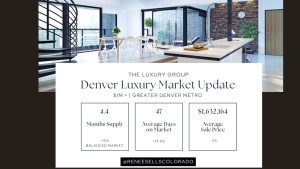As summer winds down, the Greater Denver Metro luxury market is closing August with numbers that reflect both stability and subtle shifts. For buyers and sellers in the $1MM+ category, the data tells a story of balance, patience, and a market adjusting to evolving buyer behavior.

Inventory Levels: Finding Balance
At the end of August, the luxury market stood at 4.4 months of inventory. In real estate terms, six months is often considered a balanced market, where neither buyers nor sellers have a clear advantage. At 4.4 months, Denver’s luxury sector is leaning toward balance but still slightly tilted in sellers’ favor.
For buyers, this means more options than we’ve seen in past years where inventory was razor-thin. For sellers, it means pricing strategy and presentation matter more than ever. Homes need to stand out, not simply exist, to capture attention in a more competitive landscape.
Days on Market: Slowing, But Still Healthy
Luxury homes averaged 47 days on MLS in August—an increase of 10% compared to this time last year. While this uptick may feel like a slowdown, it’s important to put it in context.
The luxury segment has always moved at a different pace than entry-level housing. Higher price points naturally attract a smaller pool of qualified buyers, and today’s buyers are also exercising more caution. They’re not rushing into offers; instead, they’re carefully evaluating lifestyle fit, neighborhood amenities, and long-term value.
For sellers, the takeaway is clear: expect longer marketing timelines, but know that well-priced and well-prepared properties are still moving.
Pricing: Subtle Shifts, Not Declines
The average sales price for homes $1MM+ in Denver Metro ended August at $1,632,164. That’s down just 0.5% compared to the previous year.
While the word “down” may catch attention, this small adjustment is hardly a signal of a weakening market. Instead, it reflects a stabilization after years of double-digit appreciation. Luxury buyers today are more value-driven—they want turnkey properties, flexible living spaces, and homes aligned with modern lifestyle trends such as wellness amenities and smart technology.
Homes that meet these expectations are still commanding strong prices, while properties requiring updates may sit longer or negotiate more.
What This Means for Buyers
If you’ve been waiting for more balance in the luxury market, late 2025 offers opportunity. With nearly 4.5 months of supply, buyers have more breathing room to evaluate options and negotiate terms. Mortgage rates remain a factor, but in this price bracket, cash buyers continue to hold significant influence.
This is also an excellent time to think about long-term positioning—whether you’re upgrading to a home with wellness features or securing a property in one of Denver’s high-demand neighborhoods, strategic purchases today may offer solid returns as demand continues to grow.
What This Means for Sellers
For sellers, success is tied directly to preparation and precision. With slightly more competition, homes that shine—professionally staged, thoughtfully marketed, and priced strategically—continue to sell. Sellers should anticipate longer marketing timelines than the frenzied days of 2021–2022, but rest assured that Denver’s luxury lifestyle remains in demand.
The Big Picture
Overall, Denver’s luxury housing market is showing signs of maturity. Instead of volatile swings, we’re seeing balance, subtle price adjustments, and buyers who are more intentional about their choices. That stability is a positive indicator for the long-term health of the market.
As always, whether you’re buying or selling, context matters. A 0.5% shift in prices doesn’t capture the nuances of your neighborhood, your home’s condition, or the unique opportunities available in your segment of the market.

 Facebook
Facebook
 X
X
 Pinterest
Pinterest
 Copy Link
Copy Link
